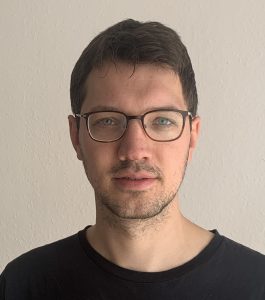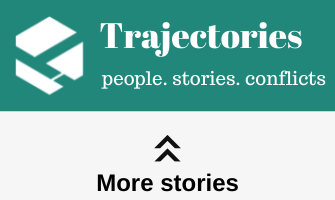How an Azerbaijani, an Armenian and a Georgian met in Berlin, or the Dolma Diaries movie
An Armenian, an Azerbaijani and a Georgian share a flat in Berlin – this sounds like the beginning of jokes popular in the Caucasus. The web series „Dolma Diaries“ was initiated for this very purpose. A group of civil society activists and television writers from the South Caucasus and Germany want to counter resentment and enemy images in the region – particularly in the context of the Karabakh conflict – with fictional story-telling and humor.
In 2017 and 2018, a script was written for eight episodes with support from the German Foreign Office. In summer 2021, the first episode was shot in Berlin with support of Friedrich-Ebert-Stiftung, and got viral in October 2022. You can watch it here, and also read below The Dolma Series producer Oliver Mueser’s interview with JAMnews.
Please check the settings for subtitles in Armenian, Azerbaijani, Georgian, English and Russian

The Dolma Series producer Oliver Mueser answers the JAMnews questions
How the Dolma Diaries was initiated?
It takes us back to 2015, when I coordinated a peacebuilding project which brought together journalists from Armenia and Azerbaijan. We discussed a post-conflict future and participants got along very well for the most part. And then, just weeks after we concluded the project, the clashes of April 2016 happened and with it came an online wave of nationalist hatred for each other.
I think the feeling that all the efforts of civil society for rapprochement were seemingly having little impact on societies as a whole was frustrating many people, me included.
This was followed by a thought process of what could potentially have an impact and – at the height of the Netflix era – it quickly became clear that some sort of entertaining online web series might have a chance to reach the hearts and minds of young people.
It was the beginning of the idea to create a joint Armenian-Azerbaijani-Georgian comedy series to counter enemy images and humanize each other. People should come for the jokes and stay for the characters.
The German Foreign Office liked the idea and funded the development of a script, which we wrote together with a Georgian, Armenian and Azerbaijani authors – Fazil Aliyev, Artyom Petrosyan, George Javakhadze, Dito Tsintsadze.
However, it proved almost impossible to receive funding for the actual production, a comedy series is not part of the usual spectrum for many donor organizations. I also think that they were wary of some of the jokes we had in the script, which were not too politically correct.
So for two years, there was no movement and we had pretty much given up on the series when the Regional Office “Dialogue Eastern Europe” of the Friedrich-Ebert-Stiftung contacted me to support the production of a pilot episode.
Then, the Second Karabakh War happened, putting all plans on hold.
- “People want to get to know each other”: what Armenians and Azerbaijanis discuss in Caucasian Crossroads FB group
- A girl named Haykanush, or find 10 similarities
- Port wine that fell victim to the Karabakh war
In 2021, we decided to go ahead with the shooting of a pilot episode, but it was clear that the environment had totally changed. So we changed the script, took out everything that might be deemed too political or insensitive and came out with pilot script as a collection of a few introductory scenes with some light humor to advertise for more episodes.
For the shooting in summer 2021 in Berlin, we could win over Georgian director Dito Tsintsadze to guide us through the shooting days with his experience, as the rest of the team including the main actors had never done anything like this.
After a long process of post-production and adding music composed by the Georgian protagonist Beka Buchukuri and animations by Azerbaijani artist Fidan Akhundova, we finally finished the episode in Spring, 2022.
In an ideal world, we will be able to produce more episodes and lots of people will watch a weekly episode and get more and more involved in the lives of a character from the respective other country and it would become harder and harder to hate a whole nationality when you sympathize with a character from that country and laugh at their jokes and better understand their side of the story.
Follow us – Twitter | Facebook | Instagram
Is it ok to do comedy in the current situation?
I have to be honest that it does feel a little uncomfortable to publish something light-hearted at a time of so much sorrow for many people.
But logically, I do not see why we should not mock the mindset that makes war even an option.
I saw an older text by Melvin Maddock about war and comedy which said that „if the purpose of comedy is to expose the insanity of everyday life, then war may be judged the ultimate insanity, and the comedian’s ultimate challenge.“
Also, since the changes we made after the 2020 war I do not see Dolma Diaries as a comedy series anymore, but rather a story centered around people with some humor in it. And that is the main reason why I think it is more than justified to publish it now.
Are there examples from similar contexts?
There are some examples of comedy or entertainment in a conflict context. The American NGO Common Ground has been producing a number of fictional TV shows called „The Team“ in several African countries for many years. In it, young people from different ethnic groups with a history of violence develop friendships through their shared love of football.
Then there is „Arab Labor“, a very successful Israeli sitcom about an Arab-Israeli journalist working in Jerusalem, which is playing on Arab-Israeli stereotypes.
Actually, comedy knows no limits. In Germany, there was even a comedy film (based on a book) three years ago about Adolf Hitler returning to modern-day Germany and experiencing all kinds of shenanigans.
- The car that saved photos and other stories of refugees from Karabakh
- “They should know that we have an enemy” – children and the Karabakh conflict
- Op-ed: What would life be like in Azerbaijan and the region without the Karabakh conflict
How do you feel about the reactions to the pilot episode? What about criticism?
I think everyone involved is absolutely overwhelmed by the reception of the pilot and so grateful for all of the positive and peaceful comments. We somehow expected that there would be lots of people who would like this kind of series but we were also bracing for a lot of negative feedback and hateful comments which we have seen few to none so far. That’s really wonderful!
There was obviously also some criticism, among them the misconception that this is a German project with a Western perspective of the South Caucasus. It was funded by a German organization and I am German, but the majority of the script and therefore the actual content was written by the colleagues from Armenia, Azerbaijan and Georgia and was put to live by actors from the three countries.
The two German characters in the episode, who seem to have no knowledge of the region and no real interest in the conflict other than to have their peace and quiet, should be understood as a parody of Western politics in the South Caucasus.
The other criticism that I would like to reject is that of missing accuracy or false parity. This is simply not the point of the Dolma Diaries, we are not replacing news media, historical commissions or international law. Our goal is add to the rapprochement process from a different angle, which allows us to make simplifications.
Other critical feedback is something we will definitely consider for further episodes. I do agree that there is a lot of room for improvement on many fronts and we want to move beyond the obvious clichés and hopefully do justice to the complexity of the relations, not just between Armenians and Azerbaijanis, but also between Georgians and their neighbours. I am optimistic that all of the comments asking for more episodes are will help us in realising a continuation.
You can reach Oliver and the team here: [email protected]




















